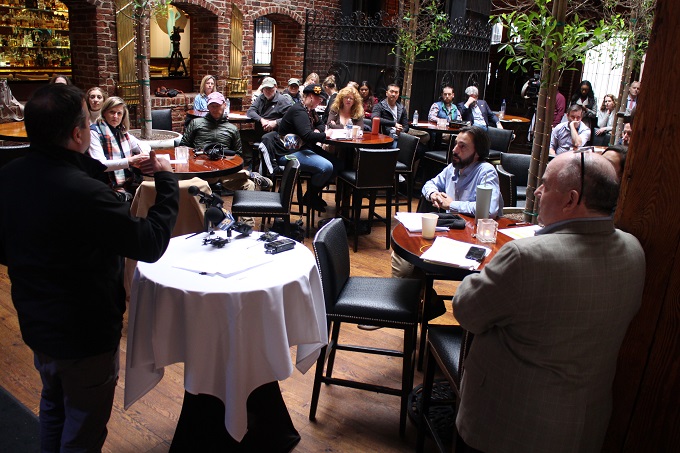
About three dozen restaurant owners and supporters gathered at Tobacco Company Restaurant for Wednesday’s press conference. (Jonathan Spiers photos)
Different viewpoints on the city’s tax collection issues that have been plaguing Richmond restaurateurs were on display Wednesday in a pair of meetings held within hours of each other, while potential changes to the process are being proposed on both the local and state levels.
About three dozen restaurant owners and supporters converged on the Tobacco Company Restaurant for a press conference organized by the Virginia Restaurant Association. The Richmond-based group is calling for changes to the city’s tax policies after multiple restaurants reported being hit with high meals tax bills due to unknown late fees and interest charges that snowballed over time.
On Wednesday, the group demanded that the city pay back those fees and interest to affected restaurants immediately.
“We’re only asking the City of Richmond to do what is right and fair and just,” said Mike Byrne, VRA’s executive director.
A couple hours later and several blocks away, a smaller group of about a half-dozen owners met with Lincoln Saunders, the city’s chief administrative officer, who told them he’s working toward that goal of refunding affected businesses but that payment determinations will need to be made on a case-by-case basis.
“It will be some months. It’s not going to happen overnight,” Saunders said, adding that if he could complete the reviews with the technology that the city has to work with and issue credits today, “I would.”
“I’ve just got to verify that what we’re seeing on a report is what was actually the case,” he said.
The two gatherings convened as proposals to allow the city’s tax collection practices to be changed are making their way through City Hall and the Virginia General Assembly.
Saunders has noted that the city’s tax policy followed existing state law, but the proposed changes are aimed at effectively circumventing the law, which requires that tax payments be applied to delinquent accounts first. The practice has resulted in a snowball effect in which tax payments are put toward unknown penalties, leaving only part of the balance paid and racking up additional penalties without notice to the taxpayer.
Senate Bill 294, which VRA is supporting, would require Richmond and any other locality in the state to apply meals tax payments to the tax returns they accompany, or according to written instructions from the taxpayer.
It also would freeze interest on any unpaid balances 90 days after an appeal or legal challenge is filed; notify taxpayers of delinquent meals taxes before issuing any liens or levies to collect them; and allow taxpayers to be awarded attorney’s fees if they prevail in a dispute.
Another law change requested by the city is House Bill 1535, which would allow discretion on the application of a seller’s commission for businesses that collect meals taxes. The commission allows businesses to keep a percentage of the meals taxes they collect to cover credit card processing fees used in collecting that tax, but only if their accounts are in “good standing” with the city.
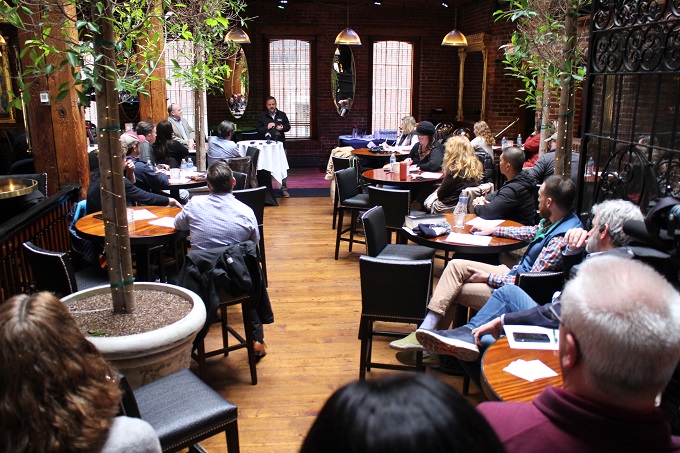
Restaurant owners shared their experiences with city tax collections during Wednesday’s gathering at Tobacco Company Restaurant.
The two bills – patroned by Sen. Bill DeSteph of Virginia Beach and Del. Michael Jones of Richmond, respectively – have been referred to the Senate and House’s respective finance committees, which are expected to take them up in coming weeks.
Meanwhile, a city ordinance to clarify the application of tax payments advanced through a City Council committee last week and is set to go before the full council at its next meeting on Feb. 12.
Those changes would address, among other things, interest and late-payment penalties applied on personal property taxes, which are currently assessed a 10 percent penalty with interest applied the first day a payment is delinquent. The change would reduce the penalty to 2 percent for the first month and hold off interest until the following month.
In a presentation to council’s finance committee last month, Saunders described the 10 percent penalty with interest immediately added as “a fairly stiff penalty for being days late on a payment.”
Saunders also said at that meeting that most of the issues experienced by restaurants and other taxpayers have been traced back to a process change that was made in 2019, when he said the city’s finance department was advised that it was not in compliance with state law and needed to apply payments to the most delinquent tax bill first. The change came a year after Richmond increased its meals tax to 7.5 percent per meal sold in the city.
“However,” Saunders told the committee, “state code does allow us to set a different standard if the governing body so chooses, and I believe, consensus-wise, we all understand that we don’t want compounding effects of late payments or missed payments.
“By making this change to our city code, finance will be able to apply payments to the month that the memo line or otherwise that the business directs them to, versus applying it to the most delinquent payment, and not having essentially recurring months of penalty and interest being assessed,” he said.
In his meeting with restaurant owners on Wednesday, Saunders said there are about 500 accounts that the city is reviewing in relation to the issues. Regarding meals tax issues specifically, in a memo to City Council earlier in the day, Saunders said 23 cases are being actively reviewed and that six were in the process of being resolved.
He said the effort will take time due to the city’s current technology, however it’s in the process of rolling over to a new system called RVA Pay, which would allow taxpayers to look up their accounts and payments online. Saunders said Wednesday he’s aiming for full implementation of RVA Pay by the end of this year, but said it was likely to take a year and a half.
Saunders emphasized that he believes repayments to restaurants will be possible in cases where it can be shown that a refund is warranted. He said such determinations would be made case-by-case and within what’s allowed by the law, with the most extreme cases addressed first.
Asked if he knew how much money was involved overall, Saunders said he didn’t know the number off the top of his head.
Some restaurants have reported tens or even hundreds of thousands of dollars owed to the city. At the earlier gathering at the Tobacco Company, such stories were relayed by Patrick Stamper, co-owner of Beauvine Burger Concept; Matt Mullett, co-founder of Richbrau Brewing; and Kevin Grubbs, owner of Latitude Seafood Co.
Grubbs’ account of receiving a $68,000 bill that he said stemmed from penalties accrued from a late payment he made in 2020, when the city was proposing a tax amnesty program in the early months of the COVID-19 pandemic, is what brought the issues to light in recent weeks, though restaurant owners had been complaining about them for years.
Byrne, who started the VAR group last year, said he has since heard from about two dozen restaurants, one of which reported a bill as high as $424,000. He said Wednesday’s press conference was held to share those stories and put pressure on the city to repay those restaurants now, not next year.
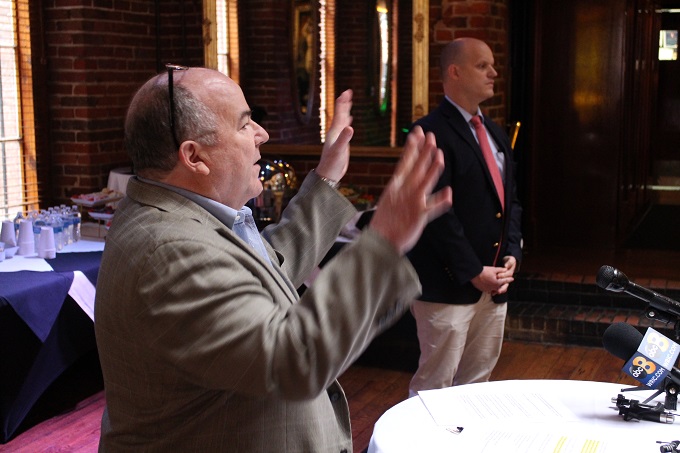
Mike Byrne of the Virginia Restaurant Association led the press conference alongside attorney Kyle Wingfield.
“There’s been no solution. We still have a broken finance department with old technology, and RVA Pay isn’t going to solve that,” Byrne said before the press conference. “The finance department and the city have the right to negotiate or negate penalty and interest if it’s been accrued incorrectly, and they haven’t. Nobody’s gotten any money back.”
In his meeting with owners that included Grubb and Mullett, Saunders maintained that he was committed to seeing the process through.
“I can’t fix the stress and frustration that everyone has experienced with this,” Saunders said, “but I’m going to do everything I can to make it right.”

About three dozen restaurant owners and supporters gathered at Tobacco Company Restaurant for Wednesday’s press conference. (Jonathan Spiers photos)
Different viewpoints on the city’s tax collection issues that have been plaguing Richmond restaurateurs were on display Wednesday in a pair of meetings held within hours of each other, while potential changes to the process are being proposed on both the local and state levels.
About three dozen restaurant owners and supporters converged on the Tobacco Company Restaurant for a press conference organized by the Virginia Restaurant Association. The Richmond-based group is calling for changes to the city’s tax policies after multiple restaurants reported being hit with high meals tax bills due to unknown late fees and interest charges that snowballed over time.
On Wednesday, the group demanded that the city pay back those fees and interest to affected restaurants immediately.
“We’re only asking the City of Richmond to do what is right and fair and just,” said Mike Byrne, VRA’s executive director.
A couple hours later and several blocks away, a smaller group of about a half-dozen owners met with Lincoln Saunders, the city’s chief administrative officer, who told them he’s working toward that goal of refunding affected businesses but that payment determinations will need to be made on a case-by-case basis.
“It will be some months. It’s not going to happen overnight,” Saunders said, adding that if he could complete the reviews with the technology that the city has to work with and issue credits today, “I would.”
“I’ve just got to verify that what we’re seeing on a report is what was actually the case,” he said.
The two gatherings convened as proposals to allow the city’s tax collection practices to be changed are making their way through City Hall and the Virginia General Assembly.
Saunders has noted that the city’s tax policy followed existing state law, but the proposed changes are aimed at effectively circumventing the law, which requires that tax payments be applied to delinquent accounts first. The practice has resulted in a snowball effect in which tax payments are put toward unknown penalties, leaving only part of the balance paid and racking up additional penalties without notice to the taxpayer.
Senate Bill 294, which VRA is supporting, would require Richmond and any other locality in the state to apply meals tax payments to the tax returns they accompany, or according to written instructions from the taxpayer.
It also would freeze interest on any unpaid balances 90 days after an appeal or legal challenge is filed; notify taxpayers of delinquent meals taxes before issuing any liens or levies to collect them; and allow taxpayers to be awarded attorney’s fees if they prevail in a dispute.
Another law change requested by the city is House Bill 1535, which would allow discretion on the application of a seller’s commission for businesses that collect meals taxes. The commission allows businesses to keep a percentage of the meals taxes they collect to cover credit card processing fees used in collecting that tax, but only if their accounts are in “good standing” with the city.

Restaurant owners shared their experiences with city tax collections during Wednesday’s gathering at Tobacco Company Restaurant.
The two bills – patroned by Sen. Bill DeSteph of Virginia Beach and Del. Michael Jones of Richmond, respectively – have been referred to the Senate and House’s respective finance committees, which are expected to take them up in coming weeks.
Meanwhile, a city ordinance to clarify the application of tax payments advanced through a City Council committee last week and is set to go before the full council at its next meeting on Feb. 12.
Those changes would address, among other things, interest and late-payment penalties applied on personal property taxes, which are currently assessed a 10 percent penalty with interest applied the first day a payment is delinquent. The change would reduce the penalty to 2 percent for the first month and hold off interest until the following month.
In a presentation to council’s finance committee last month, Saunders described the 10 percent penalty with interest immediately added as “a fairly stiff penalty for being days late on a payment.”
Saunders also said at that meeting that most of the issues experienced by restaurants and other taxpayers have been traced back to a process change that was made in 2019, when he said the city’s finance department was advised that it was not in compliance with state law and needed to apply payments to the most delinquent tax bill first. The change came a year after Richmond increased its meals tax to 7.5 percent per meal sold in the city.
“However,” Saunders told the committee, “state code does allow us to set a different standard if the governing body so chooses, and I believe, consensus-wise, we all understand that we don’t want compounding effects of late payments or missed payments.
“By making this change to our city code, finance will be able to apply payments to the month that the memo line or otherwise that the business directs them to, versus applying it to the most delinquent payment, and not having essentially recurring months of penalty and interest being assessed,” he said.
In his meeting with restaurant owners on Wednesday, Saunders said there are about 500 accounts that the city is reviewing in relation to the issues. Regarding meals tax issues specifically, in a memo to City Council earlier in the day, Saunders said 23 cases are being actively reviewed and that six were in the process of being resolved.
He said the effort will take time due to the city’s current technology, however it’s in the process of rolling over to a new system called RVA Pay, which would allow taxpayers to look up their accounts and payments online. Saunders said Wednesday he’s aiming for full implementation of RVA Pay by the end of this year, but said it was likely to take a year and a half.
Saunders emphasized that he believes repayments to restaurants will be possible in cases where it can be shown that a refund is warranted. He said such determinations would be made case-by-case and within what’s allowed by the law, with the most extreme cases addressed first.
Asked if he knew how much money was involved overall, Saunders said he didn’t know the number off the top of his head.
Some restaurants have reported tens or even hundreds of thousands of dollars owed to the city. At the earlier gathering at the Tobacco Company, such stories were relayed by Patrick Stamper, co-owner of Beauvine Burger Concept; Matt Mullett, co-founder of Richbrau Brewing; and Kevin Grubbs, owner of Latitude Seafood Co.
Grubbs’ account of receiving a $68,000 bill that he said stemmed from penalties accrued from a late payment he made in 2020, when the city was proposing a tax amnesty program in the early months of the COVID-19 pandemic, is what brought the issues to light in recent weeks, though restaurant owners had been complaining about them for years.
Byrne, who started the VAR group last year, said he has since heard from about two dozen restaurants, one of which reported a bill as high as $424,000. He said Wednesday’s press conference was held to share those stories and put pressure on the city to repay those restaurants now, not next year.

Mike Byrne of the Virginia Restaurant Association led the press conference alongside attorney Kyle Wingfield.
“There’s been no solution. We still have a broken finance department with old technology, and RVA Pay isn’t going to solve that,” Byrne said before the press conference. “The finance department and the city have the right to negotiate or negate penalty and interest if it’s been accrued incorrectly, and they haven’t. Nobody’s gotten any money back.”
In his meeting with owners that included Grubb and Mullett, Saunders maintained that he was committed to seeing the process through.
“I can’t fix the stress and frustration that everyone has experienced with this,” Saunders said, “but I’m going to do everything I can to make it right.”
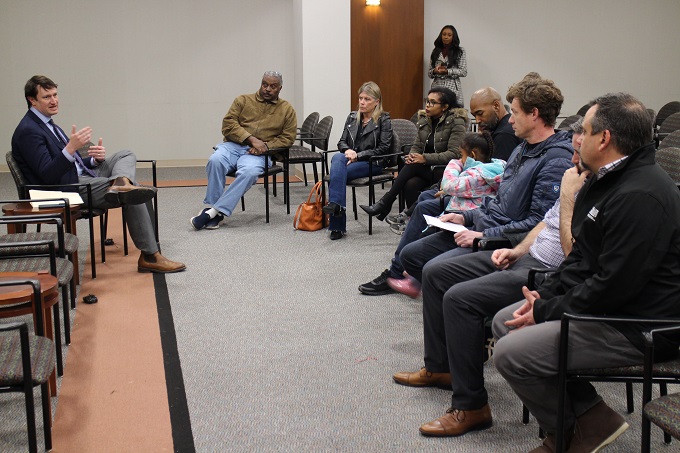
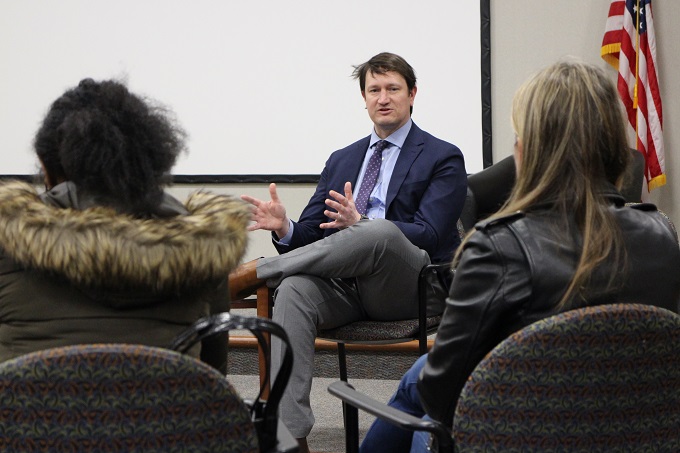
Isn’t it amazing how quickly the government demands your money from you yet when the table is turned it won’t “happen overnight” and could take months or even a year and a half to get to your case? And for what? So the city can confirm that’s what’s on their reports is correct? Gee, that really inspires confidence. A year and a half!?! Some of these restaurants won’t even be around in a year and a half! Unacceptable. It’s not rocket science to look into a restaurant’s case and see their payment history alongside the massive penalties you charged. So… Read more »
The development community was promised a new electronic system for years to service plans and permits. The HBAR MF Council committed to work with the City on it.. Millions were spent on it and it failed. Wasted money. What works is manpower, and that’s what we really wanted. so we now have a full complement of trained staff processing building plans at city hall. And it’s working. The City needs to commit itself to process these claims from the restaurant community and crunch the numbers accurately to save these businesses from going under and/or leaving altogether. Its just math! A… Read more »
Has anyone received their Business License Renewal and Business Tangible Personal Property Tax forms yet? They’re due March 1st, but you can’t even download the 2024 version from their website yet, it’s still the 2023 version.
FYI … I called 311 and they haven’t sent them yet. Apparently the 2024 version is available online under “Finance Forms”, I was looking under “Tax/License/Fee > Businesses” which still links to 2023. I can use that but I swear they keep sabotaging us by mailing them out so late.
And then payments go to a firm in Charlotte to be processed not even supporting a Virginia company.
CIty sucks at a LOT but used to Central Fidelity Bank and Consolidated Savings based in RVA that did payments processing….but early 2000s it all went to Wachovia and hence Wells Fargo through mergers and bank closures. The city got rid of payment staff years ago and let their bank directly process payments with a credit to City’s account. They are the lowest priced vendor and it would be nice if they had a VA firm but heck if they changed to a VA firm it would probably tied to Stoney and cost so much they would have to overbill… Read more »
Mayor Stoney wants to become our next Governor yet, under his watch, upgrading computer systems, most recently with regard to the Meals Tax collection process, hasn’t been completed in a timely fashion. Losing a portion of Richmond’s tax base due to restaurant operators either leaving the city or not expanding in the city is a recipe for not being considered for higher office.
Never before in my life have I witnessed incompetence in politics like Levar Stoney. And that’s saying a lot because politicians are the most incompetent people on the planet. Those who can’t do, go into politics.
I am a longtime resident of the city and I’m so tired of hearing people ask why we voted Levar Stoney into office. I was in the 62.3% of the electorate who voted against him. Don’t blame city residents for this incompetent crook. The system is rigged.
Total failure of executive leadership. No amount of finger pointing, finessing “solutions” or anything else works with this crew and culture. After 7 years you can’t blame the computer (or the customer) when you could have fixed it 6 years ago but were too wrapped up in the mishmash of random distractions large and small. No wonder so many people are so adamant against the giant boondoggles that come out of City Hall. In this case, fix it. Fix the utility bills and refund too. Do it now, not “in 18 months.” Bring in the accounting team, and if costs… Read more »
The damage Stoney has done to this town is amazing.I guess Lincoln Saunders is the cleanup the mess man.
Cleanup mess man?? What in the world did they think when the PR person who has basically been a political yes man/ma’am (was Chief of Staff for First Lady Dorothy McAuliffe among other CoS positions) is to run the city as its administrator.
I’ve never seen Stoney at a city council meeting except for once,but his name is always on these papers and proposals that come before council.